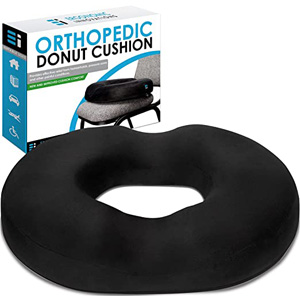I’m married with 2 children, and live in England. I had “The snip” back in December 1997 aged 37. My story has been on the website for some years now as a narrative of the procedure itself. As my vasectomy was ten years ago, I would like to take this opportunity to update my story to include the changes it’s made to my life, why I got involved in the newsgroup and this website, and changes that have happened in the decade since.
Firstly, I’d like to answer the three questions everybody asks.
- Why did I choose to get a vasectomy? The reason I had a vasectomy in the first place is that at the time I made the decision, all things considered, it was the best overall option.
- Do I regret it? Nope – not one bit 🙂
- Has it changed my sex life? The answer to that one is that it probably hasn’t changed the frequency, but it certainly has increased the spontaneity somewhat and removed the worry of my wife getting pregnant, which was quite a big issue as we had had failures of other methods of birth control in the past, and some scares along the way!
My wife and I started our family late in life (mid 30’s). In the space of less than 4 years, she had 2 miscarriages and two full pregnancies. Both pregnancies were far from problem-free. Our first child was born by emergency cesarean 2 months premature, and spend nearly 2 months in hospital after the birth. Our second child was late, labor started normally but ended in another emergency cesarean due to complications arising from the first C section.
We had been discussing the long term future for some time before my wife fell pregnant with our second child, and jointly decided that our second child would be the last child whatever happened in the future. During the second pregnancy, I thought about long term contraception. We’d had condom failures, and in the past, my wife managed to fall pregnant whilst on the mini-pill. It was clearly going to be a choice of which one of us was going to opt for sterilization. I decided to investigate vasectomy, as most other forms of contraception were either unsuitable, proved unreliable for us, or had too many risks. I talked to colleagues who had had it done, asked questions on my local hospital website, got some books out of the library, and searched the net for what information I could find, which wasn’t a lot way back then!
I came to the decision that vasectomy was probably the simplest, most reliable method and that it represented the least medical risk of any of the options available to us. I spent some time coming to terms with the idea of me being sterile before suggesting it. To be honest, it didn’t take long to become happy with the idea, as it was the obvious choice. After the delivery of our second child, the consultant advised us to “quit whilst ahead”. That piece of advice merely cemented the decision to not have any more kids and validated the decision I had already made that vasectomy was the obvious choice, so a couple of months after my son was born I put the idea to my wife.
She was surprised and pleased as I had always said I wouldn’t have a vasectomy. This was before having children – an experience which changes your perception of many, many things. Her only concern was that I waited a few months until the “Cot death” (also known as SIDS) window was passed. I knew there would be some wait involved between first contacting my GP about it, and getting the procedure actually done, so we agreed that if I set the wheels in motion once we both had had time to consider the idea, by the time I went under the knife the SIDS window would have passed. I think that we waited about two weeks before I went to my GP, but I believe the decision was so obvious that the decision was final the moment I actually brought the topic up!
Our GP’s surgery doesn’t have an appointment system for morning surgery – you just turn up and join the queue. Once in the doctors consulting room, I informed him that I wanted a vasectomy. As part of this consultation, he did a “Tube check” whereby he had to grope my balls at 8.30 am! I don’t envy what doctors have to do! I’d like to say I had counseling, but in reality, all he did was to ask how old I was, how many kids I had, and their ages. He did make two points. Firstly that vasectomy should be considered permanent sterilization, but there is a risk of failure – he quoted 1 in 4000 men. Secondly, whilst vasectomy was funded by the N.H.S (National Health Service), vasectomy reversal or any fertility treatments that may be required to father a child weren’t. We did discuss that whilst vasectomy reversal is possible, the success rates are variable and that producing children by IVF is also possible, but with lesser success rates than reversal. And just to make sure that I did hear him when he said that the NHS won’t pay for reversal etc, he told me again! Having completed the chat and physical check, he told me to have a think for 2 weeks and discuss it with my wife. If I still wanted to go ahead after considering it for at least two weeks, make an appointment to see his nurse who would go through the preparation, operation procedure, and aftercare. She would also book the date and I’d have to sign the consent form.
Having duly considered it, I rang and made a date. The date agreed ended up being canceled. The night before, I developed a bug (probably caught it from one of the kids) and spent most of the night being sick. I had to ring up and cancel the appointment in the morning I was due to have it done. Something I didn’t want to do, but there was no choice. I felt that they would think I had changed my mind and was making up an excuse rather than saying “I’ve changed my mind”. I rang up a few days after I had got over the bug and re-scheduled.
The second appointment went ahead as scheduled. The night before the operation I did the shaving in the shower. The inside of my legs are fairly hairy. It struck me as a good idea to shave the inside of the legs as well as the bits I’d been asked to shave as I thought the leg fur would dangle over the operation site. Not a good idea as it turns out. I simply ended up with two stubbly surfaces chafing against each other for a while.
The operation went fine. The doctor who did the operation was my own doctor. This is pretty unusual – in England, it’s mostly done at a hospital or private clinic. I didn’t have any Valium beforehand as seems common in America. I was left alone to get undressed, lie on the table, and cover myself with a sterile sheet. I was told to lie down and relax for a few minutes. During the procedure, he constantly tried to put me at my ease. I was scared of getting an uncontrollable erection during the procedure, but thankfully never even came close to that happening. The worst bit was having the anesthetic jab, but that was no worse than a jab at the dentist. Most of the time I was mainly conscious of being pulled about. There was one point where he tugged at something and I had a jabbing pain in my kidneys. I later learned that this is called a “Reference pain”. This is when something happens in one part of the body, and the pain is felt elsewhere, and these are quite common in all manner of sporting injuries. It was momentary, and he let me rest whilst it passed. I have since heard that a small number of men that experience this during the tube check, or the procedure itself.
After the op, the nurse helped me with my underwear. I was told to wear “Supportive” underwear, so chose some tight briefs. A jock-strap would have been better, but I never thought of that. I went straight home, and straight to bed with some Paracetamol. I had Paracetamol for about 36 hours afterward. I didn’t have any pain or swelling, but it was slightly sore and uncomfortable. I was very careful about resting and exercised caution for a day or so but not to the extent of letting it affect normal life. On Saturday I was pushing a trolley round the supermarket doing the weekly shopping. I had the operation on a Thursday and was back at work on Monday. I felt OK and could have gone back earlier as I’ve got a sedentary job, but the advice is to rest as much as you can afterward. All of the stitches except 1 dropped out after about 10 days. I was glad of this, as they were uncomfortable. The one that hung on for nearly three weeks I cut it and pulled it out myself whilst in the bath.
The sperm samples bit is fun. I realized that it would be practically impossible to shoot into the small specimen jar they provided, so decided to make things easier by sterilizing a plastic funnel, and “Donating” my sample into the funnel – this worked very well! My first sample was quite good as I had been saving it, but the second one wasn’t so good. I had to take them to the hospital pathology specimen counter within 2 hours. I was slightly embarrassed the second time as there was a queue. I got the all-clear after the second sample. One of my friends made his wife help him with the samples saying “It was a joint decision, so this is a joint effort”. Wish I’d thought of that!
10 years later
There are a couple of changes to report. Firstly, my wife has always suffered from heavy, unpredictable periods. The one thing that the pill did was to regulate these to bearable. Five years after my vasectomy, her periods became more erratic and heavier than before, so she made the decision to have a Mirena coil fitted. That helped greatly. Secondly, as I write this she is coming up to menopause. Boy, the next few years is going to be fun in our house – one menopausal woman, and two teenagers in the house!
I’ve seen physical changes too. I’m a decade older, a couple of pounds heavier, but I still have a good head of hair – albeit getting greyer by the day. I’ve had a career change and now do a more physical job, which means that I’m a lot fitter than I was a decade ago, and feel better for it. All in all, not doing bad for a guy heading up to 50 quite rapidly. I have to confess, had it not been for my involvement here and in the newsgroup, I would have forgotten about the vasectomy. As it was, it was some months before I managed to train myself away from not buying condoms on a regular basis and knowing where they were hidden at any given time.
So with the benefit of hindsight, was vasectomy the right choice for what turned out to be five years? I’d say yes. It was five years when my wife wasn’t ingesting chemicals, and five years free of the worry of no unexpected pregnancies. The menopause can hit at any time, and no-one knows when. As I said earlier, we were older parents, and I must admit that I didn’t consider the menopause as part of my original decision. In my case, I would have disregarded this as a factor in my decision on the grounds that it could have happened 20 years after vasectomy, but I would advise anybody considering a vasectomy to include this factor into the decision making process. The coil couldn’t have been predicted, and if it could have been, I believe that I still would have gone ahead with the vasectomy.
As I now class myself as a “veteran”, what tips would I offer my fellow men considering vasectomy? Well, I did discuss this in the original version of the story, and to be honest the words I wrote then (some 8 years ago) still hold true today. My top tips are:
- Don’t be pressurized into having a vasectomy. Ultimately, in the context of a relationship, it’s bound to be a joint decision, but at the end of the day, it’s still your call. Take your time to consider the risks and benefits, and find out as much as you can before deciding. Consider what happens if one of the children dies. How stable is your marriage/relationship? What happens if you split up? Do you want the option of fathering more children? Examine your motives for having a vasectomy. If it’s not right for you, don’t get it done!
- Casually ask friends or work colleagues who have children if they know anyone who has had a vasectomy. Men with a vasectomy are more common than you think – they just don’t publicize the fact. If they have had one, they will probably talk openly about their experience. Get as many viewpoints and as much information as possible to enable you to make a balanced decision.
- Find out what the options are regarding if it’s covered by health insurance or a national health scheme. Mostly, it is. This does limit the choice of where you can go for the procedure to providers that have a relationship with whoever covers the bill, but you still may have the option of shopping around to find a doctor you are comfortable with.
- As well as discussing the benefits, find out what the risks are as part of the decision making process. There are good resources online to help, and there are bad ones too. Go to the doctor prepared with what you aren’t clear on, and want to ask him. He will be able to clarify anything you aren’t sure of. Your time in the consultation is brief, so doing your homework in advance of the session helps you get the best out of it.
- On the topic of doctors, the more experienced the doctor is, the less your chances of complications such as post-op infections and hematoma are. It’s perfectly legitimate to ask how long he’s been doing a vasectomy, and how often he does them, his complication rates, and how he has treated any complications that have arisen. Experience is more important than the type of procedure, and you want the top man doing it – not the new guy who has started the job this week!
- If you’re not sure about pre-op preparations (shaving), what happens during the operation, and aftercare/post-vasectomy samples – ASK!
The only thing I’d add to the list is to consider the ages of yourself and partner, and if she is likely to be undergoing the menopause any time soon. This may, or may not be a factor in your decision, but one I’d include in the checklist.
Changes with the surgery over the last decade
The procedure itself hasn’t changed a lot over the years I’ve been involved. Vas clip, the little implantable device that was going to revolutionize vasectomy has come and gone, but other than that the basic procedure hasn’t changed greatly. The “open-ended” procedure still has it’s share of fans and foes, so the jury is still out on that issue. I guess there are two areas of improvement. The introduction of “Needle-free” anesthesia, and the more frequent use of fascial interposition. No needle anesthesia is where a high-pressure air jet is used to inject the anesthetic agent, as opposed to a needle. This was introduced in the US at first and is slowly being adopted elsewhere. I’ve seen practices here in the UK advertising it on their websites. Fascial interposition is where the cut ends of the vas deferens are sheathed and buried in separate layers of muscle within the spermatic cord. The advantage to this is that it doesn’t take a great deal of time to do, but improves reliability by reducing the (already small) risk of recanalization.
Statistically, I don’t know if a vasectomy is more, or less popular than it was a decade ago. Unfortunately, the statistics that are available seem to be at least two years in the publishing, and due to the method of obtaining data most commonly used I don’t think the stats are accurate anyway! In the main, vasectomy uptake statistics aren’t calculated from doctors reporting the number of procedures they perform, but questionnaire surveys asking women’s primary method of birth control. Strange, but true. I rather suspect that over the last ten years there has been a steady uptake, no more and no less than before.
Vasectomy research continues. The one document that I feel warrants a mention is the “Evidence-based guidelines” for the UK, produced by the Royal College of Obstetricians and Gynaecologists. This document probably is the best overall assessment of past research to date and formulates guidelines for sterilization (male and female) based on a great deal of evidence that has been meticulously analyzed. The importance of this document (for me) is the standardized patient information. At the time of my vasectomy, all my information was verbal, and from the doctor. The printed patient information as recommended by this document is a huge step forward in helping men understand the procedure, it’s risks, and benefits.
There are a couple of changes in attitudes that have happened since I had my vasectomy – both as a result of the internet in my view. Firstly the attitude of doctors to patients who have done their own research, and secondly that the medical profession faced with the fact that patients are doing research have had to change.
In times past, the doctor was a god – you didn’t question or discuss with him. To an extent, there has been a change here. I think there was a change gradually occurring at the time of my vasectomy, but it’s sped up quite a bit since the advent of the internet. I think that it is has taken time for doctors to accept the fact that patients have access to all sorts of research, and can be well informed. The problem doctors face is patients who self-diagnose their condition, or have been misinformed by the websites they have visited. It can be difficult for them to persuade a self-diagnosed patient that they are in fact totally wrong. Therefore when a patient enters armed with a sheath of paper of printed web pages there is bound to be a groan from the doctor! I do think that doctors are OK with patients who have read the information in order to be able to discuss the condition with the doctor.
I probably won’t update my story again, unless there are any dramatic changes to report. I’d like to pass on my best wishes to everybody who has contributed to the newsgroup and this site over the years, and to say thanks for all the contributions – please keep them coming!
Submitted by James
Recommended products for recovery
We only recommend products we think are useful for our readers. If you make a purchase, we may earn a small commission. JockstrapsPapi Men’s Cotton Jock Strap 3-Pack
JockstrapsPapi Men’s Cotton Jock Strap 3-Pack Ice packsTheraPearl Ice Pack with Gel Beads
Ice packsTheraPearl Ice Pack with Gel Beads Home Vasectomy TestSpermCheck Vasectomy Test Kit
Home Vasectomy TestSpermCheck Vasectomy Test Kit Donut-shaped pillowErgonomic Innovations Orthopaedic Seat
Donut-shaped pillowErgonomic Innovations Orthopaedic Seat